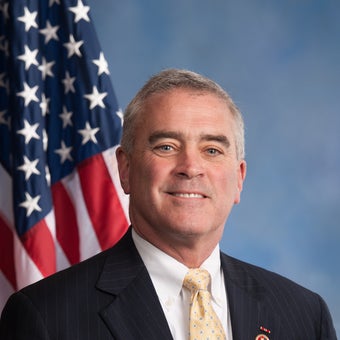'We don't leave people behind, Americans are upset' at Afghanistan collapse: Rep. Wenstrup
Rep. Brad Wenstrup, R-Ohio, on Americans and allies stranded in Afghanistan and in danger.
The message flashed up on my phone screen.
"It's very, very disheartening," the text read. "The image of American morality is being tested, and is not doing so well, so far."
This message was from one of the Iraqi interpreters I worked closely with, during my tour of duty in Iraq during 2005-2006. I was able to support him in his immigration process. He and others I supported are now safely here with their families, having gone through the special immigrant visa and legal citizenship process. They are highly contributing members of our society.
Watching as provincial capitals in Afghanistan fell like dominos to the Taliban, my thoughts were with the many courageous allies there who, like my interpreters, risked their lives alongside U.S. troops.
We made a promise to these Afghans that we would stand up for them if they stood with us. I know firsthand that our warfighters could not do their jobs without these brave men and women, and our Afghan allies volunteered to serve the United States because they believed in our cause and our people.
What happened last week was not just a tragic failure of leadership from a president who touted his decades of government and foreign policy experience to get elected.
It was also a betrayal of all the people who have made themselves -- and their families -- targets to the Taliban by siding with the United States.
The chaos, terror, and trauma of the past few weeks culminating in the fall of Kabul were not inevitable.
Back in April, I joined bipartisan members of Congress in forming the Honoring Our Promises Working Group. For months now, we have been calling on the administration to develop a concrete plan to save our Afghan allies who worked by our side over the last 20 years as we fought for peace, democracy, and human rights in Afghanistan.
We advocated to and warned administration officials, sending letters and holding calls. We crafted legislation to give the administration the tools they said they needed, including the HOPE for Afghan SIVs Act of 2021, which I co-led, and the Averting Loss of Life and Injury by Expediting SIVs (ALLIES) Act of 2021. Critical provisions of both pieces of legislation were passed by Congress and signed into law.
Instead, right now, there are countless Afghan allies as well as 10,000-15,000 American citizens still in Afghanistan, according to the Pentagon, with no apparent plan for safe evacuation.
The U.S. vacated Bagram Airfield in the middle of the night without notifying the new Afghan commander. Only a few hundred troops were left at Hamid Karzai International Airport. Private contractors, including those responsible for critical maintenance of Afghanistan's air force, were abruptly pulled out. Embassy personnel were left to quickly destroy tons of sensitive materials.
NATO allies have been vocally critical, including Germany's Armin Laschet, who said that the troop withdrawal is "the greatest debacle that NATO has experienced since its foundation."
There appears to be no plan for residual security forces or securing regional base access. It remains unclear how the U.S. will conduct counterterrorism operations in Afghanistan or counter emerging threats to U.S. national security.
JACK CARR: US HUBRIS IN AFGHANISTAN – HERE'S THE PRICE WE PAID FOR NOT LEARNING LESSONS OF HISTORY
The fact that this was predictable and avoidable makes it inexcusable. The majority of Americans support ultimately pulling U.S. troops out of Afghanistan. But instead of an orderly, conditions-based withdrawal that included strategically phasing out U.S. forces, air support, and contractors who maintain the Afghan military, what we witnessed was a hasty and botched retreat without any emergency evacuation plan for our helpers.
The resulting humanitarian and national security crisis has caused more innocent children and families to suffer and left the global community far less safe.
More from Opinion
There are comparisons being made to the fall of Saigon, but it reminds me of April 12, 1975 — the day that America conducted a dramatic and hasty withdrawal from Cambodia, abandoning nearly 2 million Cambodians to die from executions, starvation, and torture.
That was the same year that, as Congress debated aid to Cambodia, a young freshman Senator Joe Biden is reported to have said: "I'm getting sick and tired of hearing about morality, our moral obligation." He went on to say that: "the United States has no obligation to evacuate one, or 100,001, South Vietnamese." Those words, coupled with his administration's actions these past few weeks, should live on in infamy.
We had an obligation then, and we have an obligation now.
CLICK HERE TO SIGN UP FOR OUR OPINION NEWSLETTER
Over the next 72 hours, there is more need for urgent action than words. We have a short window within which to get our partners out of harm's way.
Already, there are reports of people disappearing, being targeted, and executed while they wait for a means to escape the Taliban.
Over the past few months, Congress has proven willing and able to move legislative measures necessary to accomplish this goal, but it is the executive branch's responsibility to create and execute a strategic plan to address this calamitous leadership failure and protect those who served us.
To most every American, our moral standing matters. Our leaders' actions matter to us personally.
Betraying those who serve us, as well as those who serve with us, betrays us as a decent people.
CLICK HERE TO GET THE FOX NEWS APP
Our allies deserve better; our U.S. veterans deserve better; the American people deserve better.
The whole world is watching.
















































